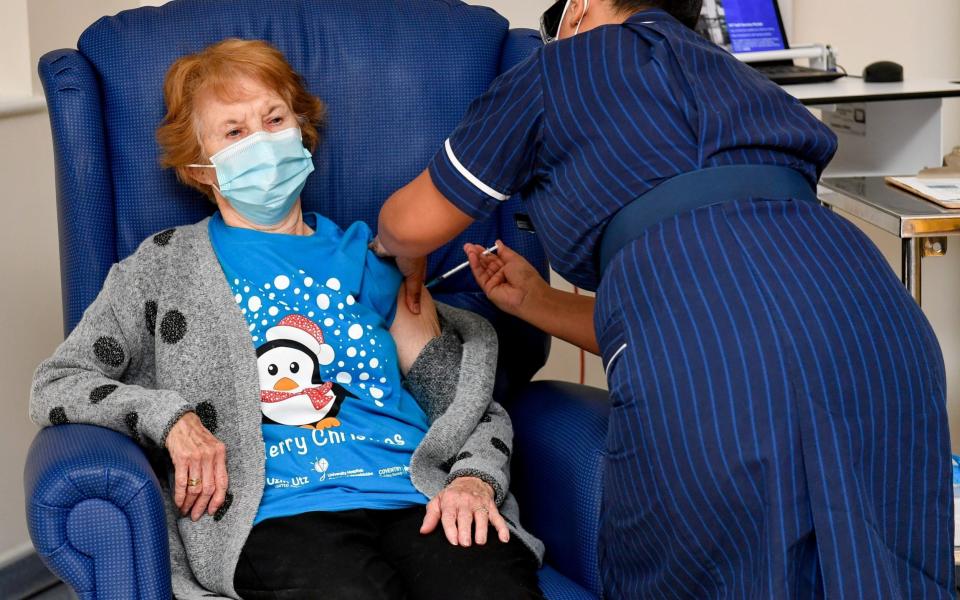Quarter of a million people to receive the jab by the end of the week, as NHS ramps up roll-out


A quarter of a million people are set to receive the coronavirus vaccine by the end of the week, with more than 200 GP hubs about to start offering jabs.
The NHS is ramping up its vaccination programme, but GPs have warned of “logistical challenges” ahead as they attempt to roll it out.
The Secretary of State for Health and Social Care, Matt Hancock, has said he hoped “several million” people – starting with those aged over 80, frontline NHS and care-home staff, and residents – would receive the jab by Christmas.
So far, around 30,000 people are estimated to have received vaccines, at around 70 hospital sites. This week, the programme will be scaled up significantly.
More than 100 GP sites in England are due to offering jabs from Monday and 200 due to come on stream during the week, with the first roving teams are sent into care homes.
Officials hope that by next week, as many as 300 GP centres – each delivering at least 975 vaccines a week – could be taking part in the roll-out, along with 83 hospital sites.
However, ambitions to deliver approximately a million jabs a week are unlikely to be met until the roll-out expands to roughly 1,000 GP sites.
Officials said there are still hopes the majority of these could be opened before the New Year.
However, the roll-out has been hindered by safety guidance, which says every patient receiving the Pfizer jab must be monitored for 15 minutes after receiving the jab.
Some GP practices have said they are now unable to participate in the programme because they lack the space or staff to keep checks on patients.
The updated guidance was issued last week, after two NHS workers with a history of significant vaccine allergies suffered an anaphylactoid reaction to the jabs.
On Sunday Dr Nikki Kanani, NHS director of primary care, urged people to attend when they are called for their jab.
She said: "This is the greatest vaccination programme ever undertaken by the NHS, and to help vaccinate people safely we will be working with local communities to deliver it in convenient and familiar settings.
"As a GP, I am proud to be part of this huge national effort to protect our patients against the virus and I would urge the public to come forward when they are called up for the vaccine."
More than 1,000 GP practices are due to begin administering jabs in coming months, with hopes the majority will start by the end of this year.
In the new year, mass vaccination centres are due to be opened in venues including sports centres, racecourses and Nightingale hospitals.
Professor Martin Marshall, chairman of the Royal College of GPs, said: "GPs and our teams are about to embark on an enormous challenge, delivering the Covid-19 vaccination programme in the community whilst also delivering the expanded flu vaccine programme and the usual care and services our patients rely on us for.
"There are also logistical challenges but general practice has an excellent track record of delivering mass vaccination programmes, and we want to use this experience to help protect people from Covid-19 and start getting life back to normal again.
"Patients will be contacted and invited for vaccination – we would urge them not to contact their practice enquiring about vaccination, we will contact them."
NHS staff including nurses and pharmacists will work alongside GPs administer the jabs, from existing doctors' surgeries and community hubs.
Care-home residents in England will receive their first coronavirus vaccine later this week after the distribution process was finalised to ensure safe delivery of the Pfizer and BioNTech jab, the NHS said.
Britain has received 800,000 doses of the Pfizer vaccine, with around 1 million more due to arrive this week, and 4 million by Christmas.
In total 40 million doses - enough for 20 million people, as two doses are required, have been ordered.
But the vaccine programme could be sped up significantly if regulators soon authorise a vaccine by Oxford and AstraZeneca. The Medicines and Healthcare Regulatory products Agency is waiting to receive more data from manufacturers before it can take a decision.
The trials have proved controversial because of limited evidence about how well the vaccines work in the elderly. The vaccine was found to have efficacy rates of 90 per cent, when the first jab was given as a half-dose, but this has not been tested in those over the age of 55.
Overall efficacy rates were found to be 62 per cent which many scientists say would still provide significant benefits.

 Yahoo News
Yahoo News 